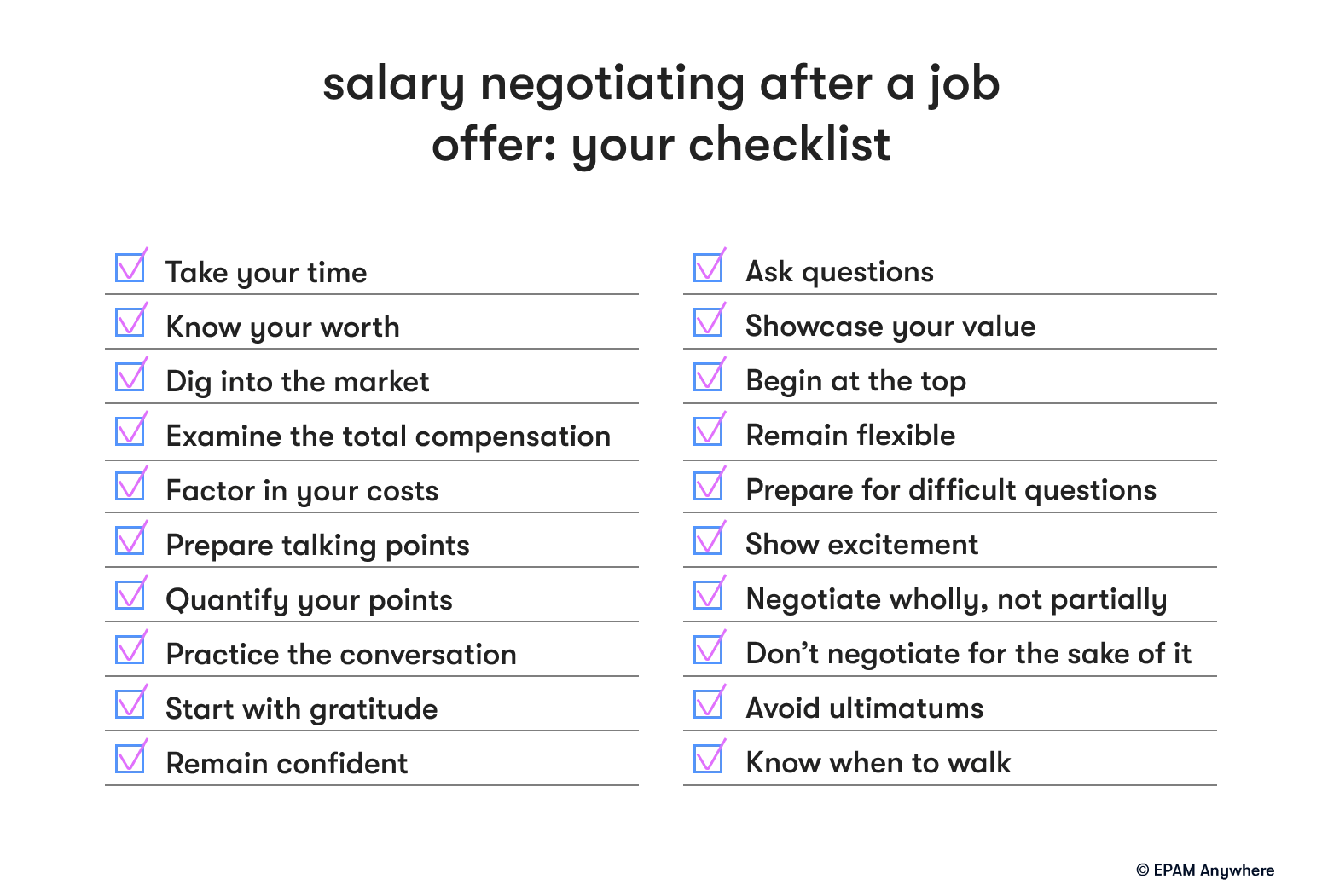Figuring out how to negotiate salary is essential for professionals who want to maximize their career growth. Even a salary negotiation that results in a slight pay increase can have a significant impact on lifetime earnings, making the process worth learning.
If you’re looking for remote IT jobs and wondering, “How do you negotiate salary after receiving a job offer?” here are 20 salary negotiation tips to get you moving in the right direction.
1: Get the time you need
One of the key parts of how to negotiate a job offer is to make sure you have the time you need to create a counteroffer. By asking for an extension on the job offer the right way, you’re effectively getting yourself the breathing room you require.
“My go-to advice in negotiating a salary us highlight your tangible assets like certification, education or professional licenses, do some research to understand the market, and take time to respond to the offer.”

Generally, you want to request the amount of time you need as soon as an offer arrives. Just make sure your request is reasonable, as anything more than a week may not work for the hiring manager.
get the best salary you deserve at EPAM Anywhere
Apply for our competitively paid positions and secure a job offer with one of the leading software engineering companies in the world
2: Know your worth
Before presenting a counter while negotiating a salary offer, you need to understand your worth. Consider your experience, skill set, education, and certifications at a minimum. You may also want to figure out the value of your work to an employer, such as the profit increases or cost decreases you were able to capture in your career.
Additionally, assess the comprehensive value of your current (or more recent) total compensation package. This will help you thoroughly understand your earnings from your last position, which is a valuable part of the broader equation.
3: Dig into the market
Taking the time to research the market is another critical part of how to negotiate salary after a job offer. You want to see how much similar professionals are earning in roles that are like the one you’re trying to land. Additionally, you want to explore how much competing employers are paying for these roles today when they’re hiring.
By digging into the market, you can learn more about what average salaries look like in your area. Along with ensuring that your expectations are reasonable, it lets you assess the competitiveness of the job offer you received and identify a target salary to work toward when negotiating.
“Regarding salary negotiations, one of the best options is to do your research. While it is true that some positions have a budget, this can be in balance with the market. So when you want to negotiate, start by stating your skills and level, leveraging the market information, and arguing why you deserve what you’re asking for.”

4: Examine the total compensation package
Before you finalize your target salary, you also need to do more research into what the role you’re trying to land offers. Lower wages are potentially offset by higher-value benefits. As a result, when it comes to how to negotiate salary after a job offer, you need to examine the total compensation package.
Total compensation is essentially the value of the pay rate coupled with all the benefits and perks you’d receive. Anything from paid time off to home office stipends is worth factoring into the equation, allowing you to understand what the employer is providing to a stronger degree.
5: Factor in costs
When you’re learning how to negotiate a higher salary, one path you need to consider is factoring in your costs. Every position comes with unique expenses, and some companies may cost you more out of pocket than others. At a minimum, you need to understand what these costs are and how they impact your perceived value of the salary. That way, you can pick a target pay rate that makes sense for the situation.
6: Prepare talking points
Before you start a conversation with the hiring manager, a key part of how to ask for a higher starting salary is to prepare for the discussion. Identify talking points that you want to present in advance. For example, you may want to go over details from your research while highlighting related professional achievements that provide employers with value.
The goal here is to give the conversation some structure. In addition, it helps you organize your thoughts, which will make it easier for you to maintain a strong position when it’s time for the discussion.
7: Quantify your points
After you have talking points, a crucial part of how to negotiate salary after an offer is to integrate supporting data to quantify the details. Numbers are powerful in these conversations, so when you discuss your achievements, make sure to include metrics that demonstrate your value clearly.
Quantifying the details also makes you come across as well-prepared and data-oriented. Both of these qualities can make your position stronger, as it prevents the hiring manager from assuming that the salary you’re requesting was chosen arbitrarily.
8: Practice the conversation
Just as you want to rehearse your answers before an interview, practicing the conversation that lies ahead is a critical piece of salary negotiation advice. This allows you to get comfortable with what you’re going to share. Moreover, if you engage a trusted family member or friend in the process, it’s a chance to secure feedback that can refine your approach.
If practicing alone is your only option, use one of two approaches. First, you can rehearse in front of a mirror, allowing you to monitor your body language. Second, you can record your practice session, giving you a video to review for the same purpose.
9: Start with gratitude
When it comes to how to renegotiate a salary, it’s always best to start the conversation with an expression of gratitude. Let the hiring manager know that you appreciate the job offer, as well as the time and energy they took during the hiring process.
Remember to also discuss what you enjoyed learning about the company, hiring manager, and position as you were recruited. This demonstrates that you remained engaged during the process, which is often considered a sign of excitement when it comes to the opportunity.
“It's better to start the negotiation process by expressing gratitude for the job offer and enthusiasm for the position. This sets a positive tone for the conversation and shows that you're excited about the opportunity.”

10: Remain confident
During salary negotiations, confidence is essential. If you apologize for attempting to negotiate or stumble when presenting your request, the hiring manager may doubt whether you’re being reasonable. It could also cause them to question whether you genuinely have the capabilities they believed you possessed, which isn’t ideal.
You want to come across as composed and self-assured without seeming arrogant. By achieving that balance, the hiring manager will see your position as stronger, and that makes a difference. Remember that you’ve done your research and know your worth, as that can make maintaining a confident attitude easier.
“Large companies value people with creative thinking and those able to organize something big. An example of conveying this message during salary negotiations would be, “I organized and held a conference on improving the curriculum at a major technology university in my city. Now the students can get more relevant knowledge and join your company after graduation. In the future, I can organize and hold conferences for your company too, to promote it and attract new customers.”

11: Ask questions
When you’re figuring out how to counteroffer a salary, make sure you engage with the hiring manager when you need additional information. There are questions to ask the recruiter and questions to ask before accepting a job that can help you gather details you didn’t discover during your research, and these can make it easier to determine what salary range is appropriate for the role.
Additionally, there are questions you may want to ask during the negotiation conversations. For example, you might want to know if any points besides salary are negotiable or what’s been budgeted for the position. Smart questions allow you to keep the discussion moving forward while gathering additional information, and that may make finding a mutually acceptable solution simpler.
12: Showcase your value
When you negotiate a job offer, you need to focus on showcasing your value throughout. The idea is to highlight why offering you more money is worth it to the company. Outline the achievements that resulted in a financial gain for your past employers and discuss how you can help this potential employer overcome challenges. By using that approach, you’re essentially justifying your request, and that may increase the odds of the hiring manager agreeing or at least adjusting the offer to fall more in your target range.
13: Begin at the top
A key part of how to negotiate salary for a new job is to present your top figure during the discussion. This provides space for the hiring manager to negotiate down while still staying in your target range.
“An important tip I’d add is going higher. There’s always a chance the recruiter has the budget to accommodate your needs. But if you go with a lower salary just because they said that’s all they had, there’s no way they’ll accommodate you.”

Otherwise, if you present your entire range, the odds are high that the hiring manager will begin on the lower end. By only offering the higher figure, the hiring manager isn’t sure where the bottom of your range sits, so they may err on the side of caution and avoid aiming overly low.
do a reality check of your salary expectations with us
Apply for an opportunity to talk to our hiring managers and check if your desired salary is realistic
14: Remain flexible
While your goal is typically to negotiate a higher salary, remain flexible during the process. There are situations where companies may not have much wiggle room when it comes to pay. However, instead, they might be able to offer a stronger benefits package to increase the value of your total compensation.
Consider what benefits or perks could offset a salary that isn’t exactly where you want it. Then, if the hiring manager can’t do too much about the pay rate, see if they can adjust those benefits or perks instead.
15: Get ready for difficult questions
Another crucial part of how to ask for more money from a job offer is to know that tough questions are likely to come. The hiring manager may ask if you’re considering other offers, whether you’d say “yes” immediately if they provide what you request, or whether their company is your top choice.
Generally, these aren’t explicitly to put you on the spot or make you uncomfortable. Instead, the hiring manager is trying to gauge whether going the extra mile for you is a wise use of their time. Be honest but tactful when you respond, ensuring that you can keep the conversation moving forward.
16: Show excitement
Another critical part of how to negotiate a salary offer is to make sure that the hiring manager can clearly tell that you’ll accept the job if an agreement is reached. Showcasing your enthusiasm for the opportunity goes a long way in this regard. Otherwise, the hiring manager may doubt whether you’re genuinely interested in the role, which makes them less inclined to jump through hoops to get you what you want.
Usually, this means exercising caution when discussing other employment paths you can take. If you spend too much time focusing on offers you’re receiving from elsewhere, the hiring manager may wonder if you’re trying to get a higher offer here as leverage to use for the job you actually want. Make sure there’s no doubt that you’ll forgo those opportunities for this one if an agreement is reached.
“Do your research to understand the market and compare your current status. Using facts when negotiating gives you clarity and supports your request. Also, consider your skills and your value proposition. All the things that make your performance outstanding should be considered. And ultimately — trust yourself.”

17: Negotiate wholly, not partly
When you’re focused on how to ask for a higher salary offer, you may incidentally concentrate the entire conversation on pay instead of the big picture. If there are several points of the job offer you want to adjust, make sure to negotiate the whole, not just one part at a time.
The issue with parting things out is that the hiring manager may need to secure approvals to get what you requested. If that’s the case, breaking down the discussion to get that handled only to learn afterward that you have more you need to discuss doesn’t make a great impression. It may seem like you’re nitpicking or could cause you to come across as disorganized or fickle.
Instead, make sure to discuss every point you want to adjust during a single conversation. Then, once you work out a total compensation package that seems like a fit, pause the discussion until suitable approvals are obtained. That way, if the company can bring it all to the table and it meets your needs, no further negotiation is required.
18: Don’t negotiate for the sake of negotiating
While negotiating a salary after a job offer is often wise, don’t negotiate for the sake of engaging in the process. Instead, only launch these conversations if it’s genuinely necessary, and only dive into pay or benefits you genuinely feel need an adjustment to make accepting worthwhile. That means if an initial offer falls in line with what you want and is competitive based on your research, you can potentially bypass negotiating altogether.
19: Avoid ultimatums
In the world of salary negotiations, ultimatums are rarely a smart move. Telling a potential employer that they need to make a specific change “or else” isn’t going to do you any favors. It’s not a sign of strength. Instead, it comes across as pushy, aggressive, or threatening, and that may cast doubts on your level of professionalism. If that occurs, even if your request was reasonable and doable by the company, they may decide your mindset isn’t ideal, causing them to withdraw the offer.
Furthermore, an ultimatum backs you into a corner. If an employer declines your request and you said you’d refuse the job if they did, you’ve effectively ended the conversation. You have little choice but to walk away, as going back on your ultimatum shows that you’re willing to lob empty threats, substantially weakening your position.
“If you encounter pushback, remember to stay calm and professional. It's all part of the dance. And always, always have a boundary in mind—the minimum you're willing to accept. If today's negotiation doesn't meet your expectations, think ahead. Consider negotiating for a future review.”
20: Know when to walk
One of the hardest parts of how to negotiate a salary offer is learning when walking away is best. There may be times when the company simply can’t provide what you need to make accepting the job worthwhile. Often, that manifests as a reluctance to negotiate or to provide counteroffers that are significantly lower than the amount you’re requesting. If that occurs, getting on the same page might not be possible, so you may need to decline the job offer if the company can’t meet your needs.
If you do need to decline, make sure to do so gracefully and professionally. Thank the hiring manager again for their time but let them know that what the company can provide won’t meet your needs. Wish them luck in securing a suitable candidate, too, and let them know you’d like to remain connected. After that, continue with your job search.

Frequently asked questions

With a focus on remote lifestyle and career development, Gayane shares practical insight and career advice that informs and empowers tech talent to thrive in the world of remote work.
With a focus on remote lifestyle and career development, Gayane shares practical insight and career advice that informs and empowers tech talent to thrive in the world of remote work.
Explore our Editorial Policy to learn more about our standards for content creation.
read more





















